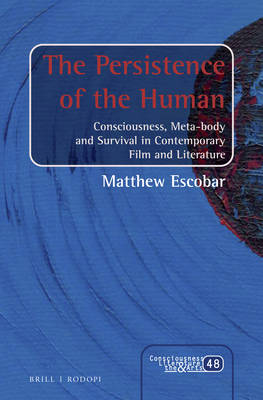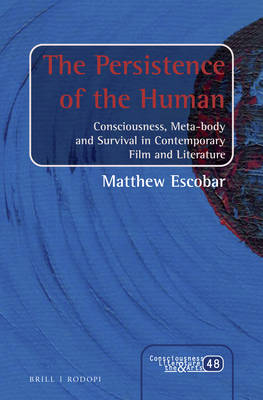
- Retrait gratuit dans votre magasin Club
- 7.000.000 titres dans notre catalogue
- Payer en toute sécurité
- Toujours un magasin près de chez vous
- Retrait gratuit dans votre magasin Club
- 7.000.0000 titres dans notre catalogue
- Payer en toute sécurité
- Toujours un magasin près de chez vous
The Persistence of the Human
Consciousness, Meta-Body and Survival in Contemporary Film and Literature
Matthew Escobar
183,45 €
+ 366 points
Description
Recent narrative fiction and film increasingly exploit, explore and thematize the embodied mind, revealing the tenacity of a certain brand of humanism. The presence of narratively based concepts of personal identity even in texts which explore posthuman possibilities is strong proof that our basic understanding of what it means to be human has, despite appearances, remained mostly unchanged. This is so even though our perception of time has been greatly modified by the same technology which both interrupts and allows for the rearrangement of our experience of time at a rate and a level of ease which, until recently, had never been possible.
Basing his views on a long line of philosophers and literary theorists such as Paul Ricoeur, Daniel Dennett and Francisco Varela, Escobar maintains in The Persistence of the Human that narrative plays an essential role in the process of constituting and maintaining a sense of self. It is narrative's effect on the embodied mind which gives it such force. Narrative projects us into possible spaces, shaping a temporary corporeality termed the "meta-body," a hybrid shared by the lived body and an imagined corporeal sense. The meta-body is a secondary embodiment that we inhabit for however long our narrative immersion lasts - something which, in today's world, may be a question of milliseconds or hours. The more agreeable the meta-body is, the less happy we are upon being abruptly removed from it, though the return is essential.
We want to be able to slip back and forth between this secondary embodiment and that of our lived body; each move entails both forgetting and remembering different subject positions (loss and recuperation being salient themes in the works which highlight this process). The negotiation of the transfer between these states is shaped by culture and technology and this is something which is precisely in flux now as multiple, ephemeral narrative immersion experiences are created by the different screens we come into contact with.
Basing his views on a long line of philosophers and literary theorists such as Paul Ricoeur, Daniel Dennett and Francisco Varela, Escobar maintains in The Persistence of the Human that narrative plays an essential role in the process of constituting and maintaining a sense of self. It is narrative's effect on the embodied mind which gives it such force. Narrative projects us into possible spaces, shaping a temporary corporeality termed the "meta-body," a hybrid shared by the lived body and an imagined corporeal sense. The meta-body is a secondary embodiment that we inhabit for however long our narrative immersion lasts - something which, in today's world, may be a question of milliseconds or hours. The more agreeable the meta-body is, the less happy we are upon being abruptly removed from it, though the return is essential.
We want to be able to slip back and forth between this secondary embodiment and that of our lived body; each move entails both forgetting and remembering different subject positions (loss and recuperation being salient themes in the works which highlight this process). The negotiation of the transfer between these states is shaped by culture and technology and this is something which is precisely in flux now as multiple, ephemeral narrative immersion experiences are created by the different screens we come into contact with.
Spécifications
Parties prenantes
- Auteur(s) :
- Editeur:
Contenu
- Nombre de pages :
- 228
- Langue:
- Anglais
- Collection :
- Tome:
- n° 48
Caractéristiques
- EAN:
- 9789004323629
- Date de parution :
- 15-09-16
- Format:
- Livre relié
- Format numérique:
- Genaaid
- Dimensions :
- 155 mm x 236 mm
- Poids :
- 453 g

Les avis
Nous publions uniquement les avis qui respectent les conditions requises. Consultez nos conditions pour les avis.






